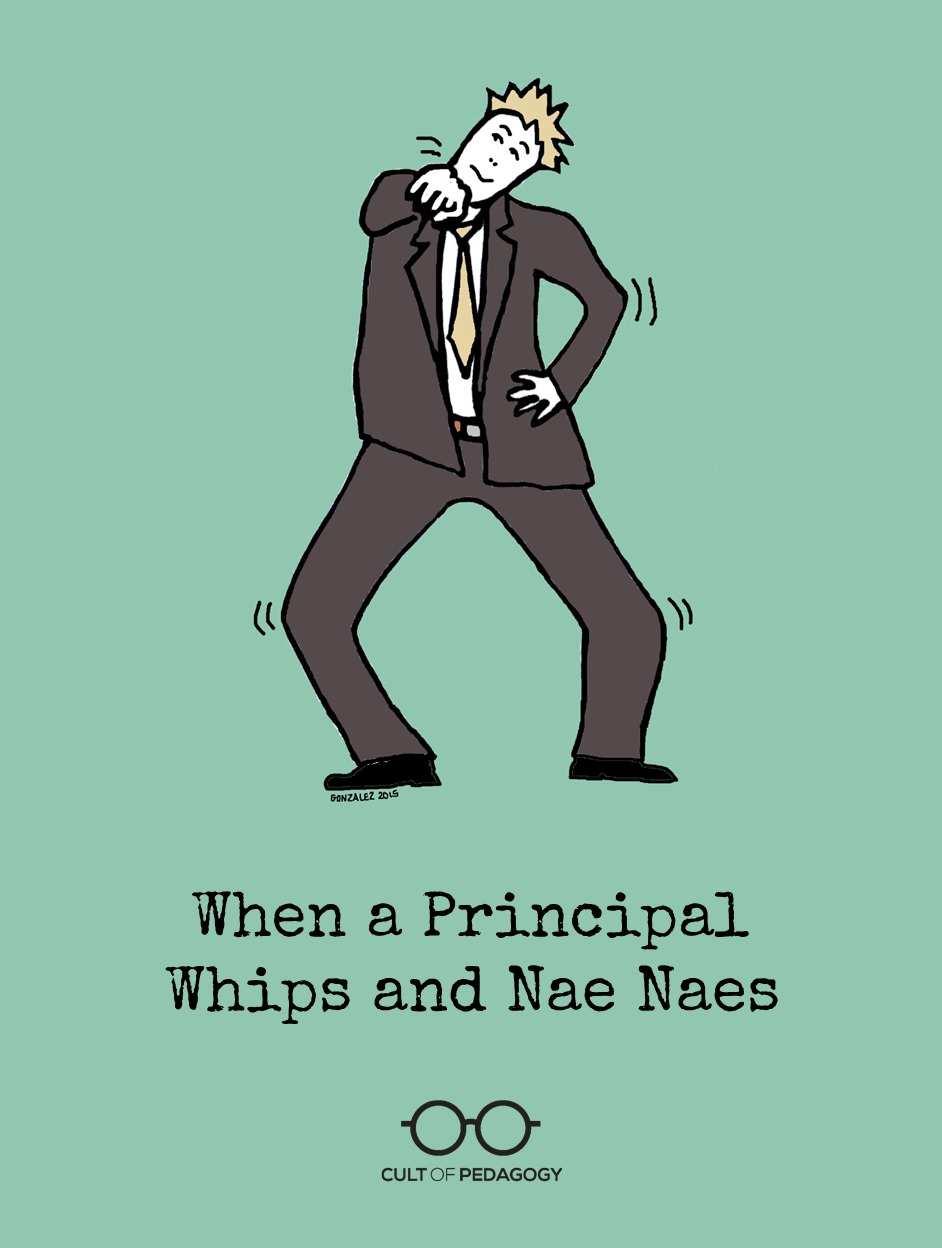
I can only imagine the noise that must have erupted from students at Hodson Elementary the day their principal, Kerwin Koerner, walked onto the gym floor and started doing the Whip Nae Nae. “I had told students that if they raised a certain amount of money, I would lip sync a song. They did not know which song it would be, but they wanted to see their principal acting goofy so they blew the goal out of the water.”
And their efforts paid off. “When the music started,” Koerner says, “the kids went crazy.”
This was not the first time the Owasso, Oklahoma-based administrator had taken the goofy route to motivate his students. From lip-syncing other songs (“Call Me Maybe” was the first) to dressing up in character, Koerner recognizes the value of letting students see him in a different light. “Being willing to do something embarrassing or silly accomplishes more than one goal at a time. I believe it provides a level of motivation for kids, and builds a rapport that is hard to form not being in the classroom with students every day.”
Perhaps more than anyone else in a school, administrators are bound to establish and maintain order, to command respect, to be seen as competent leaders. But taken too far, an all-business-all-the-time stance can result in an atmosphere that’s not as great as it could be. If your school culture could use a boost of positive energy, it may be time to practice the fine art of goofing around.
Ruling from Among, Not from Above
Penny Sturtevant, Principal at Big Walnut Middle School in Sunbury, Ohio, once spent some time taped to a wall at her school. As a fundraiser, she had challenged students to buy pieces of tape, which would ultimately be used to tape her to a wall. The goal was to raise enough money to tape her up so she’d stay. Her students rose to the challenge.
That kind of thing happens on a regular basis at Big Walnut. Whether it’s an assistant principal kissing a pig, the whole staff getting drenched with water for the ALS Ice Bucket Challenge, or a students vs. teachers game of Human Hungry Hungry Hippos, Sturtevant and her colleagues believe letting their hair down is an integral part of school leadership.
“I think it makes you more approachable,” Sturtevant says. “There’s the teacher who stands behind the desk and teaches, and there’s the one who stands in the middle of the room and teaches. You have to stand behind the desk at times when you have to take that posture, particularly with discipline, but I think you can deliver some difficult messages where they know that the intent is from the heart if you’ve placed yourself among them.”
We talked for a while about how neither of us has, as she calls it, the “blessing of stature,” the physical traits that naturally command respect: impressive height, a deep, booming voice, the kind of person who merely needs to utter one word and the kids straighten right up.
“Yeah,” Sturtevant noted. “Until they leave the room.”
And there’s the rub: Those who command respect by setting themselves too far above from students—whether through some degree of intimidation or by simply never relaxing enough to show any human flaws—they might only be getting respect out of fear. Or discomfort. Or just the general feeling that an “other” is present. Students will behave in their presence, yes, but their respect might run much deeper if they saw their leader as a multi-dimensional person, as a person who, in some way, is like them.
Is There Such a Thing as Too Goofy?
Research has shown that leaders in any field are more effective when they have a sense of humor. In interviews of thousands of employees in a variety of fields, researchers in a 2012 Bell Institute study found that sense of humor was one of the most-mentioned traits of strong leaders. This translates to school climate as well. In 2014, researchers at the University of Wisconsin found that “principals that employed humor had schools with more open and healthy school climates.”
But can a school leader be too silly? It’s a delicate balance, to be sure. Leaders may worry that they could venture too far into silly territory and be seen as nothing more than a clown. Or that if they relax too much, they may say or do something inappropriate and lose credibility.
I saw that worry on President Obama’s face a split second after he called Kanye West a jackass on camera: He quickly realized he had let his guard down, possibly too much. And yet I don’t know if I’ve ever liked him more than I did at that moment, because he sounded like someone sitting around the fire pit in our backyard on a summer night. Like a regular person.
Still, there is a wrong way to cut loose as a leader. A principal should obviously not behave in ways that exceed the boundaries of acceptable school behavior or dress—we’re not talking about parading around in your underwear. Leaders also need to be careful not to use humor in a way that can be damaging. The Bell study found that leaders who used humor to humiliate others or as a way of showing off were seen as less effective by employees, so keep your silliness positive. And if you’re not silly by nature, there’s no need to create a persona that doesn’t exist. Just find ways to show students and colleagues who you really are: If you play an instrument, let students hear it. If you bake, give a cooking demonstration once in a while. And if it’s going to motivate your students to have you sit in a dunking booth? You can keep that straight-laced personality intact all the way into that water, bud. The kids will still love it.
Making Memories, Strengthening Bonds
Not only does goofing around pay off with students, it can also work wonders with your staff. Teachers whose principals are more willing to be vulnerable by getting a little goofy are more likely to take healthy social risks themselves. And a staff who laughs together may get more work done: A 2015 study found that the more laughter a meeting contained, the more open and productive attendees were after the laughter died down.
And if productivity isn’t a concern, there’s always the very real value of memory making. The more you can create moments your staff and students will remember fondly, the more your school becomes a real home. As the person who sets the tone for the whole school, the administrator has the power to make these moments happen.
One of my favorite teaching memories was the year my whole faculty planned a choreographed performance on the first day of school. We were not a staff that always got along—cliques were well-established, bad blood stood between plenty of teachers who had been in the same building for far too long—but this one year, our administrators decided to start things off with a bang.
After assembling the whole student body in the gym bleachers, we played Beyoncé’s “Crazy in Love” and entered the gym in two straight lines, all of us dressed in khaki pants and white shirts. Our lines met in the middle, then we faced the students and stepped forward one at a time, shouting out our names like so many Von Trapp children, and our principal and assistant principal did the whole thing right alongside us. It was awkward and we looked old and out of touch, but the kids lost their minds over it.
And now, a decade later, every time I hear “Crazy in Love” I don’t think of Beyoncé. The only thing that comes to mind is that image of me and my fellow teachers, united for a moment as we marched into the gym, the sound of five hundred kids wild and happy in our ears. ♥
Join my mailing list and get weekly tips, tools, and inspiration — in quick, bite-sized packages — all geared toward making your teaching more effective and fun. To thank you, I’ll send you a free copy of my e-booklet, 20 Ways to Cut Your Grading Time in Half. I look forward to getting to know you better!





Beautiful writing, Jenn.
Thank you, Dave. I appreciate that.
Hey people! If you liked this one, read Adam Welcome’s October post over on EdWeek Teacher, The Principalship Needs a Makeover. It’s wonderful!
Hilarious, and well written. I did something similar as a teacher – if students completed a group project, I would sing “Baby Got Back.” They think that song is so old (maybe it is?) and outdated. They thought it was a riot that I knew the words.
That’s awesome, Lauralee. They think we’ve been this old forever! 😉
Whenever I write songs, my tweens and teens are right there beside me as I ask for suggestions on words they like best, directions the melody should go. I also sing backup to them when they solo on stage. I so love what you’ve written here because I know it works. So many times I hear, “My kids don’t respect me,” but in my experience, they respect a teacher when she feels real and with them, not lording over them. Thanks for all your eliminated writings. Always a treat to brouse through your website and discover gold 🙂
PS haha “illuminated” writings. Sorry – spell checks fairies with a sense of humor obviously.
Ha!! That clears it up. Thanks so much, Lessia!!
Came here in 2019 from your interview on the Better Leaders Better Schools podcast. Love this post and idea! What I see also, is admins who are willing to be “silly” or “fun” in moments, but remain completely rigid in their expectations of their teachers. If you’re down to let the kids see you hit the floss… but can’t give your teachers any flexibility with the allotted for a district created/mandated schedule… there’s a big problem.
Jennifer, I just LOVE reading your articles!!! I am a new ESL teacher— new as in first year, new to ESL, new as in late-40’s-stay-at-home-Mom-going-back-to-work new. My 3 kids are middle school and high schoolers now and I subbed for years and *loved* it and decided to jump in full time when they got to be this age. That decision has been one of the best ones I have ever made. My days are filled with seeing K-8th grade ESL students and they bring me such joy! Mind you, lesson plan prep for 8 grades suck and at times I want to pluck my eyes out with a fork, but the minute I walk into my schools (yes, as in plural… I am in a split position at two schools— both elementary and middle… let that settle in), I know I am in my happy place. Reading your insightful articles bring a smile to my face and offer little nuggets of knowledge that I can drop into my teaching repertoire. Thank you for your help with assisting newbies like me navigate these uncharted waters. There are so many times I find myself shaking my head or murmuring “preach, sister!” when I read your works. Other times I am scrambling for a pen to write your thoughts down. Most times I am thinking “this gal is a person I would love to meet and have a chai tea with at Starbucks.” 🙂 Enough rambling from me… just wanted to express my appreciation and give you a shout out for your greatness. Oh, and if you are ever in San. Antonio, Texas be sure and look me up. I’d love to meet you! I have a chai with your name on it.
Hi Dawn! It’s great to hear from you and I’m so glad you’re finding value in Cult of Pedagogy. Let us know if you ever have any questions or need help finding a resource!
Lovely post about a concept this is far often lost on school leaders. I once worked with a Head that claimed that she had a Senior team of bunnies and pit bulls. When she needed some tough work done, she sent in a pit bull; softer work was reserved for the bunnies. Now I’m a prinicipal, I understand her thinking but completely disagree with the idea. You don’t lose the respect of the students and staff by showing a softer side and having a sense of humour.
However, I am not a dancer ha ha.